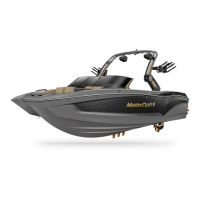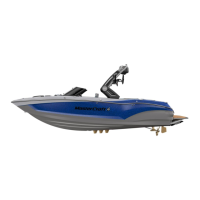INSURANCE
Even if someone else is operating the boat, the owner is generally
held liable for any damages or injuries that occur. It is in the owner’s
best interest to maintain sufficient personal liability and property
damage insurance on the boat in anticipation of potential judg-
ments. Guarding against theft is another consideration.
WEATHER
Never leave the dock without first checking the local weather fore-
cast. Weather information is available from television, radio, local
newspaper, online or from a weather channel on a VHF radio.
At certain times of the year, weather can change rapidly and boaters
should always keep an eye out for weather conditions.
While boating, pay attention to the following:
• Watch for cloud build-up, especially rapid, vertically
rising clouds.
• Sudden drop in temperature.
• Sudden change in wind direction and/or speed.
• On-board barometers, where placed on-board by the boat owner,
should be checked every two-to-three hours. A rising
barometer indicates fair weather and a rise in wind velocity;
a falling barometer indicates stormy or rainy weather.
What to do in severe weather:
• Reduce speed, keeping enough power to maintain headway.
• Put on PFDs.
• Turn on running lights.
• Head for the nearest shore or safe harbor that is safe to
approach, if possible.
• Head bow of boat into waves at 45-degree angle, if possible.
• Keep bilges free of water.
• Seat passengers on bottom of the boat, near the centerline.
• If the engine fails, tie a sea anchor on a line from the bow of the
boat to keep the boat headed into the waves. A bucket will work
as a sea anchor in an emergency.
• Anchor the boat, if necessary.
• Seek shelter on-shore whenever possible. Particularly avoid
riding out a storm that includes high wind and/or lightning, which
is especially dangerous. Avoid contact with metal portions of the
boat such as handrails, windshields, tower and cleats.

